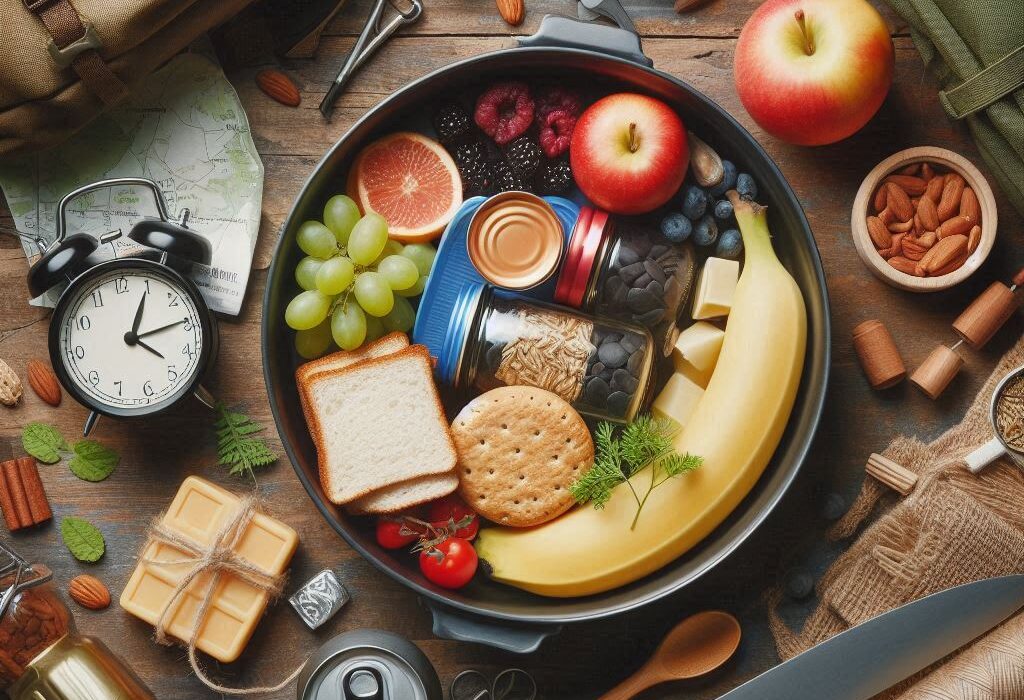Hiking is an exhilarating way to connect with nature, challenge yourself physically, and enjoy breathtaking landscapes. However, to ensure a successful and enjoyable hike, it’s crucial to plan and pack the right food. Proper nutrition can keep your energy levels up, enhance your performance, and contribute to your overall hiking experience. In this comprehensive guide, we’ll cover everything you need to know about packing food for a hike, including what to bring, how to pack it, and tips for maintaining energy and hydration on the trail.
Why Proper Food Packing Matters for Hiking
Packing the right food for hiking is essential for several reasons:
- Energy Supply: Hiking can be physically demanding, requiring a lot of energy. High-energy foods help sustain your stamina and endurance throughout the hike.
- Nutritional Balance: A balanced diet helps maintain energy levels and prevents fatigue. It also ensures that you get essential nutrients for overall health and well-being.
- Hydration: Proper hydration is crucial for hiking. Including hydrating foods and drinks helps keep you hydrated, which is essential for maintaining performance and preventing dehydration.
- Convenience: Packing food that is easy to carry, prepare, and eat on the trail enhances your overall hiking experience and reduces the risk of encountering problems with spoiled or inconveniently packed food.
What to Pack for a Hike
When packing food for a hike, consider the following types of food:
- High-Energy Snacks: Snacks like nuts, seeds, dried fruits, and energy bars are excellent for quick energy boosts. They are compact, lightweight, and provide essential nutrients.
- Complex Carbohydrates: Foods like whole-grain crackers, rice cakes, and oatmeal provide sustained energy release. Carbohydrates are a primary fuel source for your muscles, making them crucial for long hikes.
- Protein-Rich Foods: Protein helps repair muscles and keep you feeling full. Include items like jerky, protein bars, and nut butters in your pack.
- Fruits and Vegetables: Fresh fruits like apples and oranges are hydrating and provide vitamins and minerals. Vegetables like carrots and celery are crunchy and satisfying.
- Hydrating Foods: Foods with high water content, such as cucumbers and melons, help with hydration. They also provide a refreshing break from more energy-dense foods.
- Electrolyte Drinks: Electrolyte powders or sports drinks help replenish lost salts and minerals. They are especially important if you are sweating heavily.
- Cooking Ingredients: If your hike includes a camping component, consider packing lightweight ingredients for cooking, such as dehydrated meals, instant soups, and pasta.
How to Pack Food for a Hike
Packing food for a hike requires some planning to ensure that everything stays fresh and is easily accessible. Follow these tips:
- Use Airtight Containers: To keep food fresh and protected, use airtight containers or resealable bags. This helps prevent moisture from getting in and keeps your food organized.
- Opt for Lightweight Packaging: Choose lightweight, compact packaging to reduce the weight of your pack. Minimize bulky containers and opt for food that can be easily portioned.
- Pre-Pack and Portion: Pre-pack snacks and meals into individual portions. This makes it easy to grab what you need without having to unpack everything.
- Consider Temperature: Avoid packing foods that require refrigeration unless you have a cooler or insulated bag. Choose foods that can tolerate varying temperatures and will not spoil quickly.
- Label Your Food: Label containers with the contents and any important information (e.g., expiration dates) to avoid confusion and ensure you consume everything before it goes bad.
- Pack Efficiently: Arrange your food items in your pack for easy access. Place frequently used items in outer pockets or at the top of your pack for convenience.
Tips for Maintaining Energy and Hydration on the Trail
Maintaining energy and hydration is crucial for a successful hike. Follow these tips to stay at your best:
- Eat Regularly: Consume small, frequent snacks throughout your hike to keep your energy levels stable. Avoid waiting until you are hungry or fatigued.
- Stay Hydrated: Drink water regularly, even if you don’t feel thirsty. Aim for about 2 liters of water per day, adjusting based on temperature and exertion levels.
- Balance Your Intake: Aim for a balanced intake of carbohydrates, proteins, and fats. This balance helps sustain energy and keep you feeling full.
- Listen to Your Body: Pay attention to hunger and thirst cues. If you’re feeling sluggish or thirsty, take a break and have a snack or drink.
- Adjust for Conditions: In hot weather, focus on hydrating foods and electrolyte replenishment. In cold weather, choose warming, calorie-dense foods to maintain energy and warmth.
- Avoid Overloading: Don’t overpack food, as this adds unnecessary weight to your pack. Stick to essential items and avoid carrying excess, especially if you’re on a day hike.
Sample Hiking Food Packing List
Here’s a sample packing list for a day hike:
- Breakfast: Oatmeal packets or granola bars
- Snacks: Mixed nuts, dried fruit, protein bars
- Lunch: Whole-grain crackers with nut butter or jerky
- Hydration: Water bottles or hydration reservoir, electrolyte drink mix
- Fruits: Apples, oranges, or a small bunch of grapes
- Vegetables: Baby carrots or celery sticks
- Emergency Items: Extra snacks, small first aid kit
For multi-day hikes, you’ll need to adjust your packing list to include more substantial meals and possibly a portable stove or cooking gear. Consider dehydrated meals, pasta, and instant soups for easy preparation.
Conclusion: Plan and Pack Smart for Your Hiking Adventure
Packing the right food for hiking is crucial to maintaining energy, hydration, and overall enjoyment on the trail. By selecting high-energy snacks, packing efficiently, and staying mindful of your nutritional needs, you can ensure a successful and fulfilling hiking experience.
Sykes Cottages offers a range of eco-friendly and convenient accommodations that can serve as a base for your hiking adventures. Whether you’re exploring the countryside or tackling challenging trails, having the right food and accommodation will enhance your outdoor experience.
Prepare well, pack smart, and enjoy the beauty of nature while keeping your energy levels high and your hydration on track. Happy hiking!


